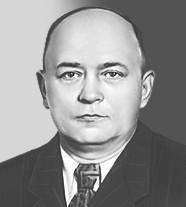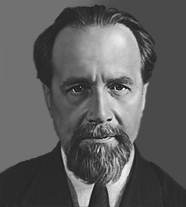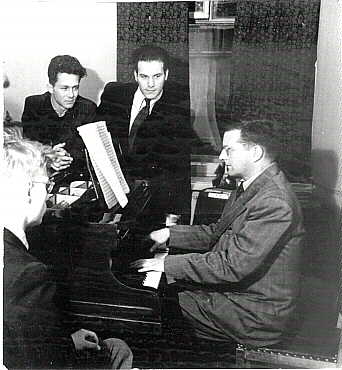He entered the
Gnessin's Primary Musical School at the age of nine.
Among his first musical teachers were Alexandra
Golovina, Elena F. Gnessina. B.Tchaikovsky's first
teacher in composition was Eugeny Messner. Then
B.Tchaikovsky in due course proceeded to the Gnessin's
Specialized Musical School, where he studied with
Vissarion Shebalin, Igor Sposobin, A.Mutly.
 
In 1943 Boris entered into the
Moscow Conservatory where he first studied
composition with Vissarion Shebalin. In 1946 Dmitry
Shostakovich began teaching at the Conservatory, and
Shebalin recommended that Tchaikovsky move to his
class.

But in 1948, during the
‘anti-Formalist’ campaign the Communist Party
launched against composers it felt had to be bent
into submission, Shostakovich and Shebalin were both
dismissed from the Conservatory. Their students were
declared the victims of ‘wrong’ teaching and so were
permitted to continue their education. During the
'anti-Formalist campaign' Boris Tchaikovsky refused
to renounce his teachers, proving the integrity and
strength of his character.
Boris Tchaikovsky thus graduated from the
Conservatory in 1949 as a student of Nikolai
Myaskovsky (Myaskovsky was also criticised by the
Party but not removed from his teaching post).
In 1949 year Nikolay
Myaskovsky had written: "...Boris Tchaikovsky is
very gifted young composer with good composers
technique and undoubtedly significant creative
individuality".
After Conservatory Boris
Tchaikovsky found an editorial post in the musical
department of All-Union Radio, but in 1952 he
decided to leave the job in order to devote himself
to composing.
From then on he earned his living from his music,
not least from film scores (he wrote more than fifty
cinema and TV film scores, incidental music for
radio and theatrical plays).
Boris Tchaikovsky also became a public figure and
occupied a number of official posts. When in 1968
Georgy Sviridov became First Secretary of the
Composers’ Union of the Russian Federation,
Shostakovich advised him to invite Tchaikovsky to
join the committee. And so he did, remaining in the
position until 1973 – refusing payment, since he
considered that this ‘public’ work should be
undertaken on a voluntary basis. Later, in the
1980s, he served on the board of the Composers’
Union of the USSR.
In 1969 Boris Tchaikovsky was
awarded by the USSR State Prize (for his Second
Symphony), and in 1985 he became a ‘People’s Artist’
of the USSR.
During the last
years of his life (from 1989 to 1996) he taught at
the Russian Academy of Music, where he was a
Professor in the department of composition.
Composers Stanislav Prokudin, Rade Radovich,
Alexander Khristianov, Elena Astafieva and Jakov
Kurochkin were the students in B.Tchaikovsky's
composition class; Yury
Abdokov was the pupil of Boris Tchaikovsky at the
post-graduate course.
Boris Tchaikovsky died on
February 7, 1996 in Moscow.
|


